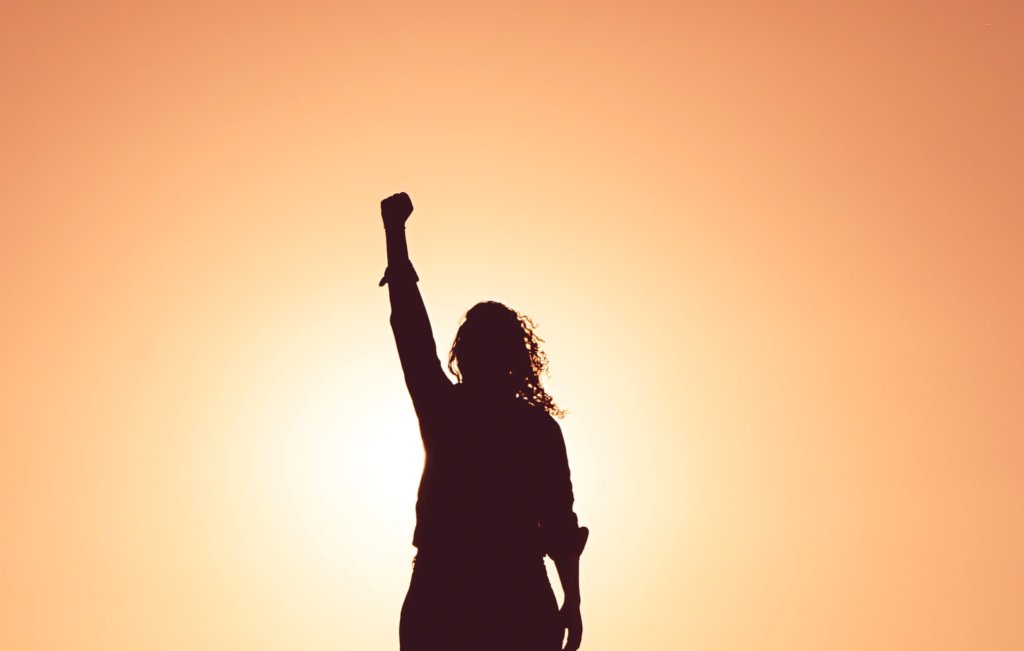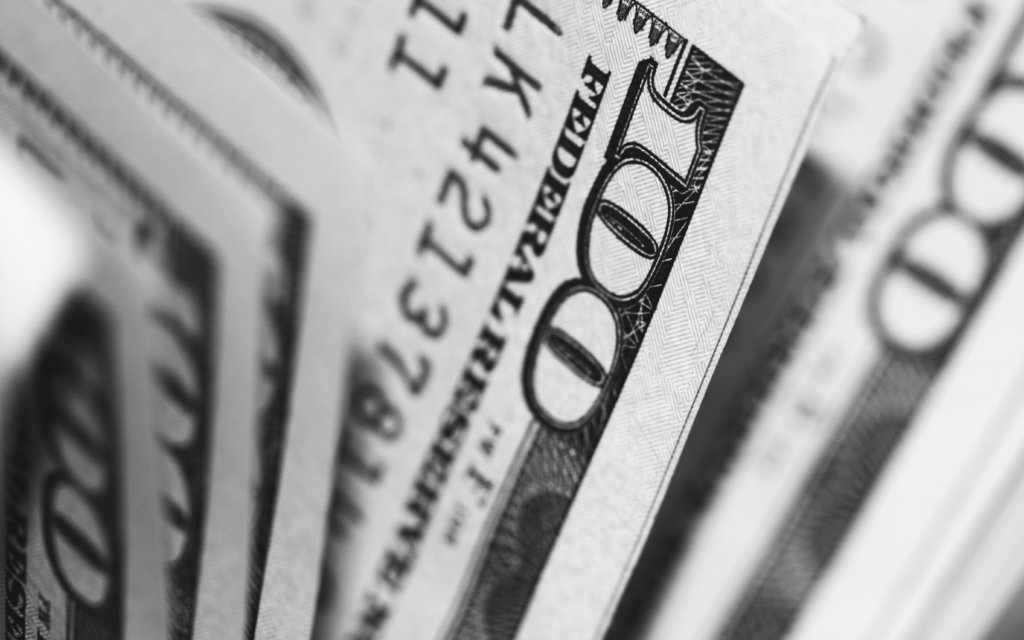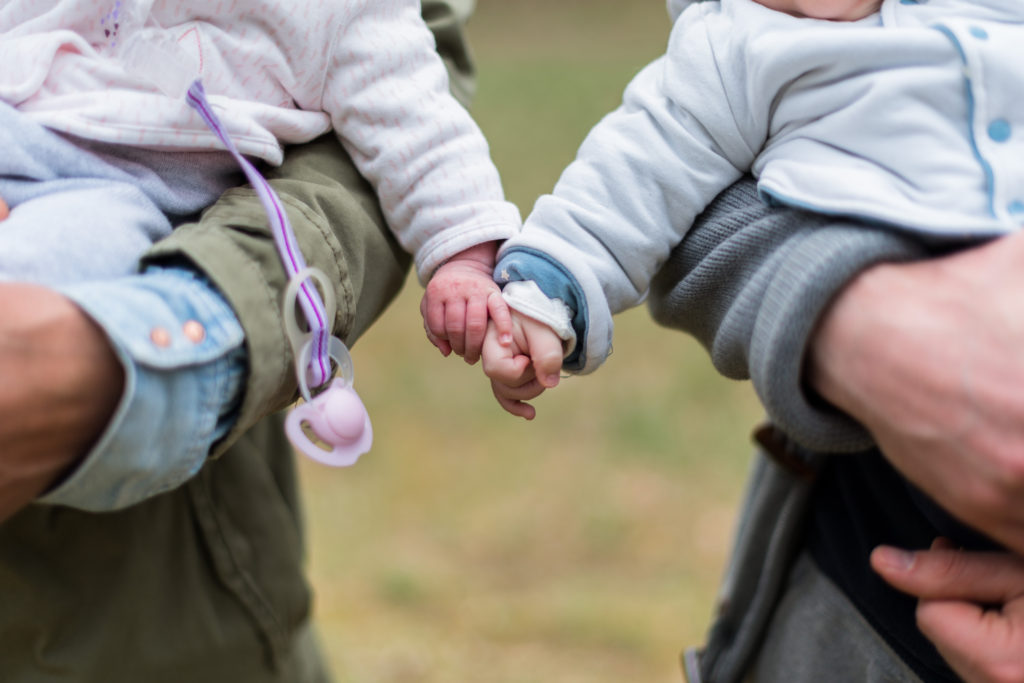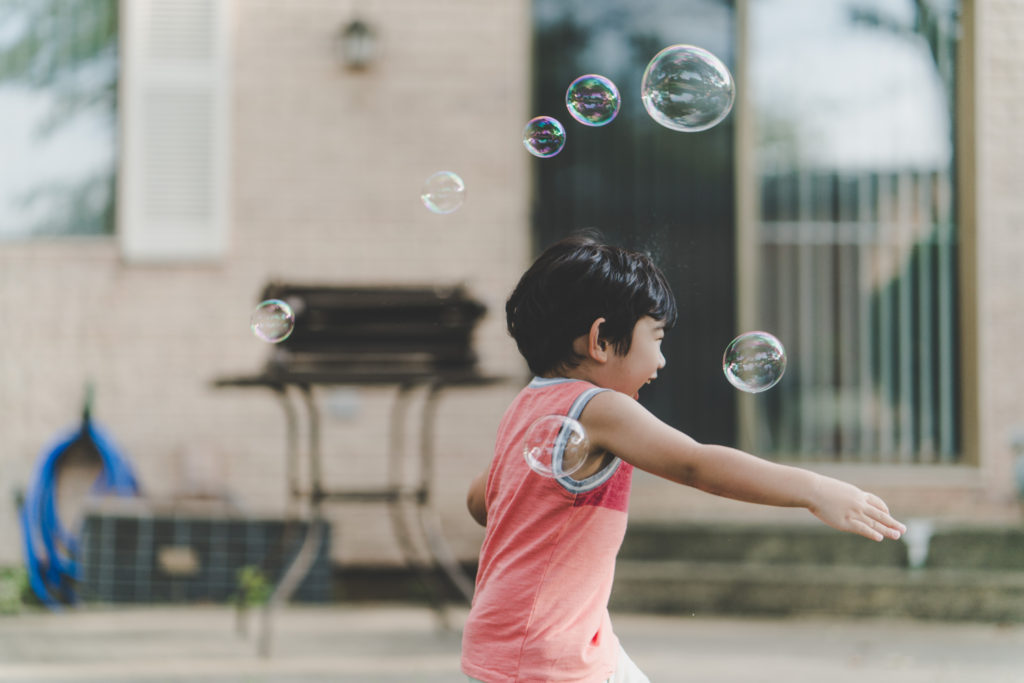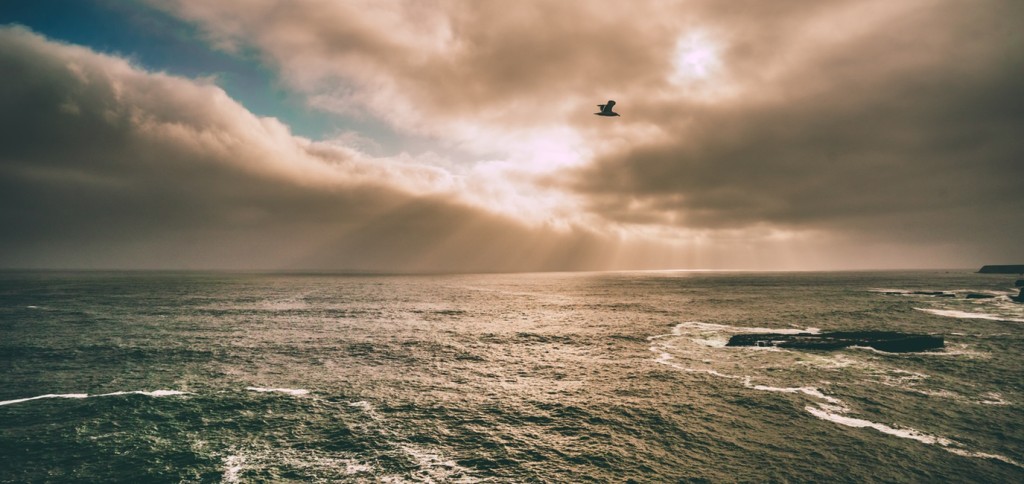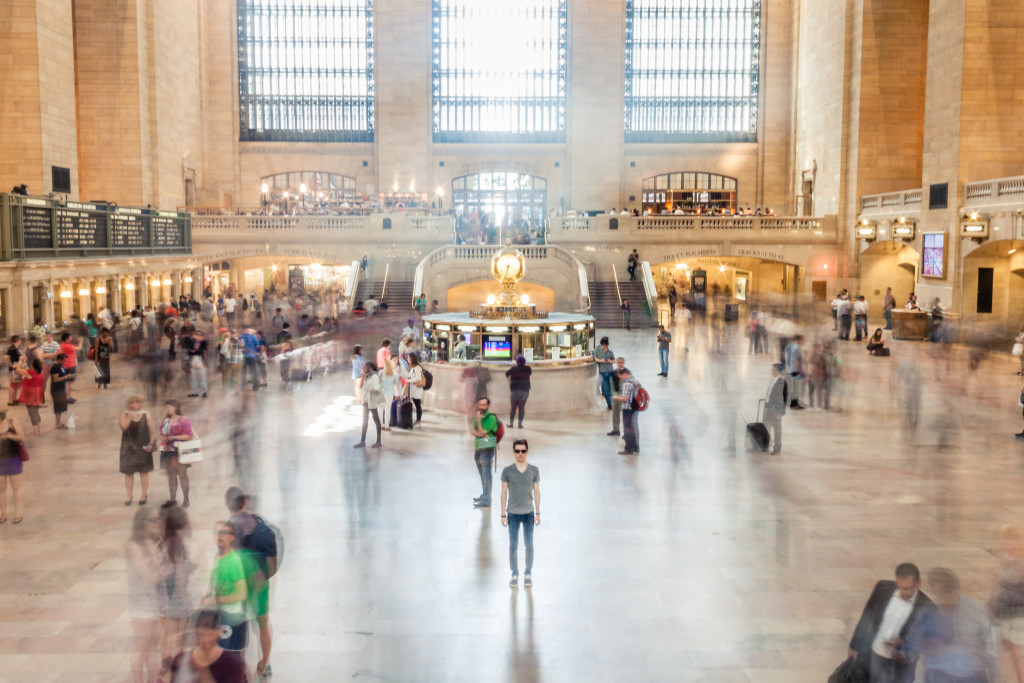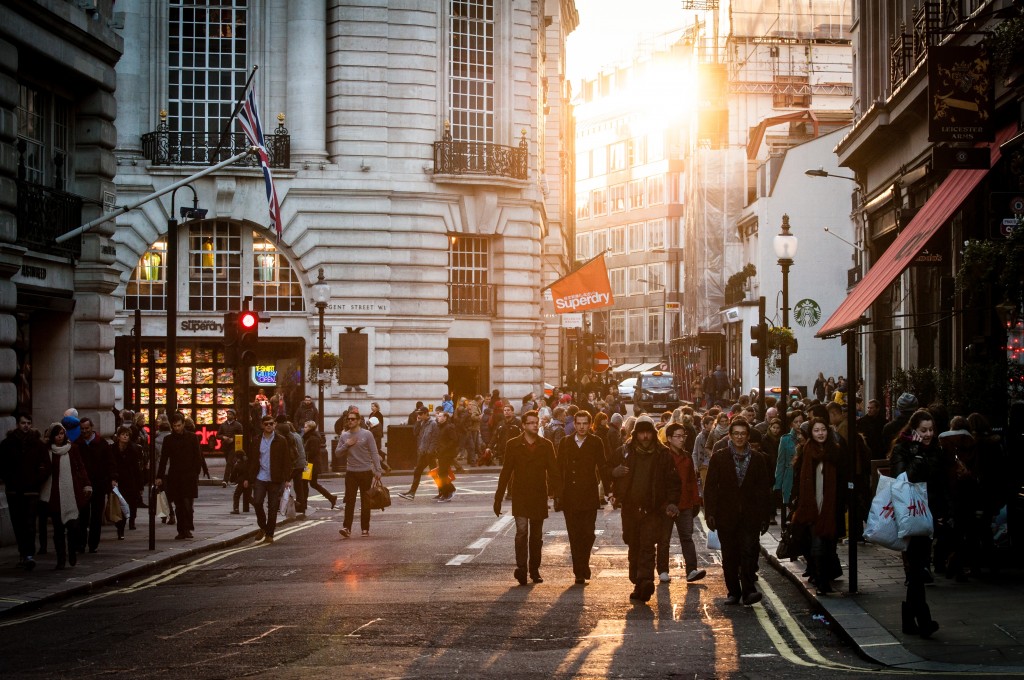June 21 and 22 are Amazon Prime days so I wanted to take a minute to talk about the reality of this company and capitalism in general.
Earlier this month, the New York Times came out with an article titled “The Amazon Customers Don’t See.” It’s quite long so I won’t detail the intricacies of the article but instead highlight a few aspects. First off, Amazon measures the time each employee spends off task at its warehouses, meaning every bathroom break is accounted for. If a person spends too long in the bathroom, they can be, and have been, fired.
One employee wrote on the internal feedback board, “It is very important that area managers understand that associates are more than just numbers. We are human beings. We are not tools used to make their daily/weekly goals and rates.”
However, Amazon warehouse employees are not treated like human beings, which is reflected in the company’s turnover rates. From July to October 2020 alone, Amazon hired 350,000 new workers, which is more than the population of St. Louis. Many recruits were hired through computer screening with little conversation or vetting. They only lasted a few days or weeks. Amazon’s turnover rate is roughly 150% a year, which is almost double that of the retail and logistics industries, according to the Times.

I urge you not to support this company. Photo by Christian Wiediger on Unsplash
Some more numbers for you: In 2019, the company hired more than 770,000 hourly workers, even though Amazon, including corporate staff, grew by just 150,000 that year. That means the equivalent of Amazon’s entire work force, roughly 650,000 people at the start of the year, left and were replaced that year. If Amazon is churning through its entire work force once or twice a year, it would need to have eight, nine, 10 million people apply each year, which is about 5% of the entire American work force. Five percent of the ENTIRE American work force.
The high turnover is built in to Amazon’s bones as Jeff Bezos said he didn’t want hourly workers to stick around for long because he viewed a large, disgruntled work force as a threat. Yeah, because then they might start asking for stuff like higher pay. . .
Also, let’s talk about racism. Black associates were almost 50% more likely to be fired than their White peers. In Amazon’s warehouse, more than 60% are Black or Latino whereas more than 70% of managers are White or Asian. So not only is Amazon burning through workers, it’s also perpetuating racism within its ranks.
Amazon is a prime (ha!) example of capitalism at its worst. Not only is Amazon exploitative, it plays to the worst part of our humanity – our desire for convenience no matter the cost. Bezos said people are inherently lazy and our nature as humans is to expend as little energy as possible to get what we want or need. He’s right, which is why Amazon sales exploded during the pandemic and the company continues to grow.
But again, I ask, what price are we paying for this convenience? We’re destroying the planet and treating people like machines. We’re supporting a company that appeals to our basest instincts and perpetuates what many are so actively fighting to change, i.e., racism. If you care about small businesses, workers’ rights, human rights, or the planet, you cannot actively support Amazon. And look, I know there are some products only Amazon sells – a “perfect” boycott is likely unachievable, but can you buy less from them? Even a little less? I know it’s inconvenient, but perhaps the price is worth it.
I dream of a world where we support our fellow human beings. A world where we demand people are treated with the respect and care they deserve. A world where we put our money where our mouths are when it comes to our values. A world where we understand sometimes the price of convenience is too high to pay.
Another world is not only possible, it’s probable.
The other day a close friend remarked as a society we have decided we will do anything to save a human life, which is both true and not true. It’s true that we are physically distancing, that we’re staying at home, that many businesses are closed due to COVID-19 because we want to save lives, but at the same time in the U.S. anyway we’re seeing the total opposite: valuing capital above all else.
Lieutenant Governor of Texas Dan Patrick wants to reopen the state and said “there are more important things than living.” In March, he went on Fox News and said “lots of grandparents” would rather die than see the U.S. economy suffer. Also, senior citizens should “take a chance on survival” for the good of the Dow Jones. He’s not alone – Rep. Trey Hollingsworth, R-Ind., said that deaths due to COVID-19 were “the lesser of these two evils” compared with a failing economy. In some ways he’s right because we don’t know how many people will die because they’re out of work, they’re starving, they’re killed by domestic violence, or afraid to go to the hospital because of COVID-19. It’s a tricky life-and-death balance for sure, but all of it I think speaks to our flawed capitalistic systems.
An article in Common Dreams said whether Americans know it or not, the government is working on behalf of capital. This is evident because the government is prioritizing the health of corporate balance sheets rather than human bodies. We know this because for the most part people are going on unemployment benefits rather than remaining on existing payrolls. We know this because we ran out of federal relief money for small businesses but not big businesses.
I keep thinking about something a finance professor at a prestigious university said to me years ago: capitalism requires an economic underclass. In order for capitalism to function, someone has to get the short end of the stick. It seems to me we’re reaching a point where the vast majority of people are in the economic underclass. I want to acknowledge some people are really, really in the underclass. Some people are suffering FAR more than others, but even people who perhaps felt comfortable before the pandemic are feeling the economic pinch now.
I said this to my neighbor a few weeks ago, but I’m reminded of Marie Antoinette, the last queen of France before the French Revolution. It’s a myth that she said, “Let them eat cake” in response to people clamoring for bread, but the sentiment is alive and well. Las Vegas Mayor Carolyn Goodman wants to reopen the city’s casinos, hotels, and stadiums, but when asked if she’d be willing to spend nights on casino floors alongside other visitors, she evaded the question and then replied, “First of all, I have a family.” How very out of touch.
What am I building to here? It seems to me we’re on the cusp of a revolution. How much more suffering do we have to endure before we say enough is enough? My spiritual teacher said, “The inevitable consequence of exploitation is revolution. When the merchants, maddened with excessive greed, lose their common sense completely and forsake their humanity totally, then the opportune time has come [for revolution] …. Revolution takes place when, from the economic perspective, only two classes remain in society: the exploiters and the exploited.”
Sounds to me like we’re there. I’m ready for the revolution y’all. I’m ready for a world that guarantees basic necessities. A world that no longer operates on the false principle that anyone can become rich if they only work hard enough. A world that puts greed in check and limits how much wealth one person can accumulate. A world where we put a stop to exploitation and value living beings for how precious they truly are.
Another world is not only possible, it’s probable.
Right now the funds in my bank account are low – I am one of those people who lives paycheck to paycheck. I think it’s fair to say I’m a slave to my paycheck and I’m not the only one. If I lost my job tomorrow, I’d be in big trouble. I notice there’s a part of me, a teeny part, that feels ashamed of that. Like if I’m poor it’s my fault because I’m not budgeting well or proactive enough. There might be some truth to that, but also I take a look around me and notice I’m not the only one experiencing this. And if I’m not the only one experiencing this, doesn’t that point to something systemic? Yes! It does!
A friend of mine works as a finance professor in a major metropolitan city and he told me something we don’t like to admit about capitalism is it requires an economic underclass. In order for capitalism to function, someone has to get the short end of the stick. I’ll remind you this is not coming from a pinko-commie, this is coming from someone who teaches finance at a well-respected university.
The ugly truth about capitalism is it requires exploitation. I read a fascinating article the other day about the myth of the ethical shopper. The author, Michael Hobbes, wrote that these days, it’s not the U.S. that’s a major culprit of sweatshops, it’s other countries. Indian children subsist off of pennies a day making clothing not for Americans, but for Indians or Chinese. Hobbes also said the production cycle is so divorced from people at the top, no one really knows where their clothes are made. Contracts subcontract out over and over again until the whole thing becomes a tangled mess. And for people in those sweatshops who try to unionize, the company says, “See you later,” and goes to another country where regulation is more lax and they can pay people less. As long as we care about getting something for the lowest price possible, we’ll continue to have this situation.
It’s not only a developing world problem, by the way, it’s also in the good old U.S. of A. Women are still paid less than men, and women of color really get shafted. And let’s not forget the exploitation rampant in sectors like food. The working conditions for people who pick produce is appalling. I bring this up because we pretend capitalism can work as a system, that it only needs a few tweaks. We pretend that anyone can become a millionaire if they only remove their mental blocks to abundance. That may be true, but what about everyone else?
Did you know approximately eight people own half the world’s wealth, according to Oxfam? The Economist takes issue with the math, but even they conclude a small number of people own half the world’s wealth. That means the rest of us are fighting for a small piece of pie. I don’t know about you, but I’m not OK with this. We have a minimum wage, why don’t we have a maximum wage? Why don’t we have rules about how much wealth one person can own? If that sounds too communist, OK, then how about enhancing our social safety nets? Right now, the U.S. government is cutting funding for food stamps, Medicare, and other social services. If I lose my job tomorrow, I’m more likely to lean on friends and family than the government. Isn’t the government supposed to be of the people, by the people, and for the people? I’m sure not seeing a lot of that.
I realize this post is not an optimistic one, but in this instance, I think it’s important to acknowledge the ugly truth. Until we do, we’ll never see the changes we’d like in our society, and I long for those changes.
I dream of a world where everyone everywhere has their basic needs met. A world where we aren’t slaves to our paychecks. A world where we can lose our jobs and still be taken care of. A world where we start treating all living beings as worthy and deserving of respect.
Another world is not only possible, it’s probable.
As I contemplate President Trump’s recent comments about “shithole countries” and the upcoming birthday of Martin Luther King Jr., I can’t help but wonder what it means to be a leader because one I think of as a leader, and the other I do not. In the past, I would have told you a leader is a person in charge, but as I’ve gotten older, I’m realizing how false that is. A person may be in charge due to privilege or nepotism or a host of other reasons, and not be what I call a leader.
The answer to the question, what is a leader, also changes depending on the circumstances. A leader could be someone with the most physical prowess or keen intellect. These days? It seems the majority of our supposed leaders are those with money or privilege. Furthermore, those in power seem more interested in exploitation and personal gain than the welfare of society as a whole.
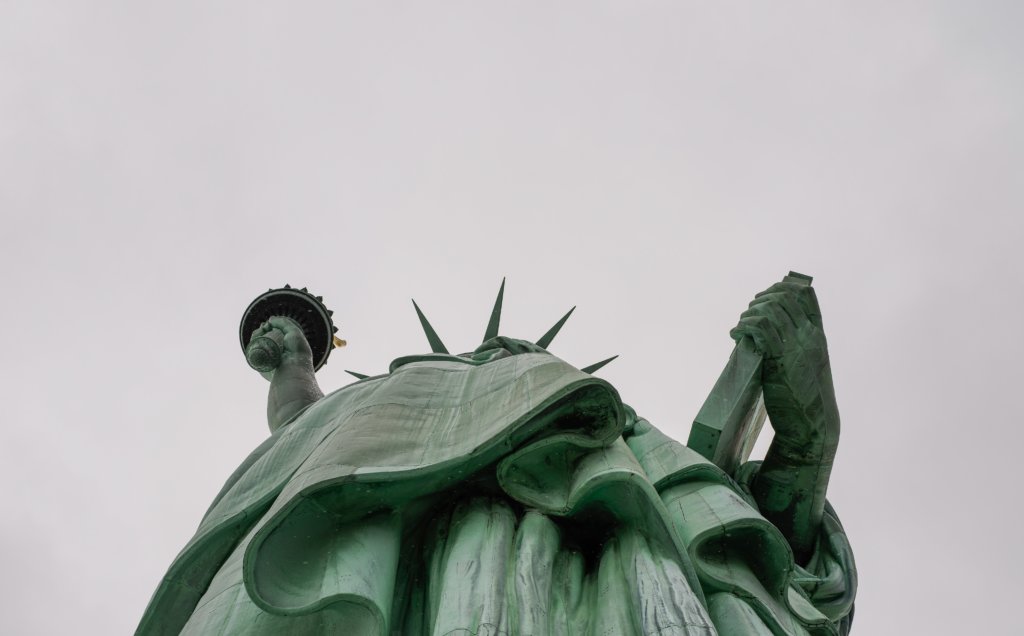
This image seemed the most appropriate. Photo by Annie Spratt on Unsplash.
According to my spiritual teacher, this is the cycle of social evolution, where one particular class enjoys domination and superiority over another. By class, he means the laboring class, the warrior class, the intellectual class, and the merchant class. And each class rises and falls over time in a process that cannot be halted.
“The function of a [leader] shall, therefore, be to see that the dominating or the ruling classes do not have any scope for exploitation,” he said. “The moment one class turn into exploiters, the life of the majority becomes miserable; a few enjoy at the cost of many whose lot is only to suffer. More than that, in such a state of society both the few and the many get degenerated. The few (exploiters) degenerate themselves due to [an] excess of physical enjoyments, and the many (exploited) cannot elevate themselves, because all their energy is taken up in mundane problems …. Hence, for the physical, mental, and spiritual welfare of the administrator and the administered of the society as a whole, it is essential that no one be given any scope to exploit the rest of the society.”
Leaders then are active participants, they are like watchdogs, keeping an eye on signs of exploitation and then doing something about it. It seems to me, the primary quality of a leader is someone who is concerned with the well-being of humanity as a whole. A leader is not someone who cares only about their selfish pleasures. I won’t speak for everyone, but I’ll say for myself, I have an expectation a leader will swoop in out of nowhere and save us all. And furthermore, that a leader possesses skills and qualities that I do not. Like they’re magical beings while I’m a mere human. Is that true though?
Vince Lombardi said, “Leader’s aren’t born, they are made.” That means we all possess the potential to be leaders. We all have the power to change something, to do something. We may not all trigger systemic change like Rosa Parks, but maybe. We’ll never know if we don’t try.
I dream of a world where we recognize we all have the potential to become leaders. A world where we understand leaders are not necessarily those in power and could be anyone, including us. A world where we each do our part to shepherd humanity toward a brighter tomorrow.
Another world is not only possible, it’s probable.
The other week I posted a news story on facebook with commentary that I have compassion for robbers and the robbed, and was met with so much vitriol it astounded me. People I didn’t know called me a moron (and worse), told me to get off of facebook, etc. What I heard over and over again was, “I’m poor and I’ve never robbed anyone.” That’s great! I’m glad there are poor people that don’t rob others. Keep not robbing.
What strikes me is how me-centered that viewpoint is. There is an inherent expectation that we all act a certain way, but guess what? We don’t. And placing so much onus on the individual doesn’t work. I’m reminded here of the recently passed healthcare bill in the House of Representatives. The terms of the bill are ludicrous in my opinion. “Have you ever been sick? Are you a woman? So sorry, no healthcare insurance for you or you’ll have to pay staggering premiums. Good luck with that.”
Indian philosopher and economist P.R. Sarkar said, “Rich people do not want to consider the needs of the poor, because if they do, they will have to make some sacrifices. Where will their luxuries and comforts come from if hunger does not burn the bellies of the poor?” Our capitalistic society encourages this mindset, encourages us to look out only for ourselves, and try to scramble to the top of the heap by declaring, “I worked hard for this so I earned it!” Yes, but that means the suffering of others continues. It’s easy to dismiss, to say the people in that position just didn’t work hard enough, or try hard enough, or act the right way, or whatever. There are a thousand excuses we could give.
Sarkar said, “[T]o admit that these sufferings are the result of social injustices implies that everyone is responsible.” And that’s the thing, we are all responsible. We are all responsible for each other. The human family includes everyone. I’ve quoted this African proverb before, but it’s pertinent so I’m quoting it again: “If you want to go fast, go alone. If you want to go far, go together.”
I want to go far. I long to go far. How do we do that? What can little ole me do from her apartment here in California? It sounds cheesy as all get out, but one of the answers is love. I’ll close with another quote from Sarkar:
Like any other problem, great or small, there is only one way to solve economic problems, and that is through genuine love for humanity. This love will give people guidance; it will show them what to do and what not to do. It is not necessary to study great numbers of books or to rely upon those who speculate with the future of the silent masses. The only essential requirement is to look upon humanity with genuine sympathy.
I may not be a politician, I may not be an economist or a philanthropist or a CEO, but I sure as heck can love humanity. I can have compassion and sympathy and empathy for those around me. I can keep loving people even through their missteps. I can keep spreading love and embodying love and talking about love even when people call me foolish. And I will.
I dream of a world where a genuine love for humanity is awakened in all of us. A world where we all look out for each other. A world where we understand our progress is linked to those around us. A world where we understand the human family includes everyone and we act accordingly.
Another world is not only possible, it’s probable.
The other day I had an interesting experience. Coming home from the city, I stepped into Walgreens and noticed a couple in front of me, primarily because the man had a huge, green backpacking backpack. The couple left and I didn’t think much of it until about half an hour later when I exited my station and I saw the same man! This is surprising because there are many trains and many stations he could have taken, but we ended up at the same one. Keep in mind, my station is a residential one – it’s not a popular destination.
If that wasn’t intriguing enough, the same day I sat next to someone at the train station and he too, got on my train and exited my station. When I noticed his presence as well as the man with the green backpack, all I could do was laugh. It reminded me that knowingly or unknowingly we are all moving together.
In Sanskrit there are several words to denote this concept, one of which is samáj, which means “society,” or a group of people who are moving happily and peacefully. In today’s world, this concept seems especially important to remember. Some people live in their own little bubble, thinking they are the only ones in existence. Other people are not thinking much about their actions and only looking out for themselves.
In the U.S. in particular we praise independence and rugged individualism. We’re in love with the myth of the self-made person, the lone wolf. We romanticize the notion of self-sufficiency, or at least that’s my perspective. However, I would challenge that notion. As I said to a friend the other day, it takes a village to raise a child, but I also think it takes a village to be a person. We’re not meant to do everything by ourselves, and why would we want to? Like it or not, we’re all in this together. Noticing those people on the train the other day reminds me we may think we’re our own little universe, but our universes are moving together. We are all on this big blue planet spinning through space.
My spiritual teacher says, “The proper thing is for all members of the society to move in unison; and while moving together, each member should feel a responsibility for every other member of society. Those who are unable to move must be carried so that the rhythm of the collective movement remains unbroken.”
I love this notion because we may pretend otherwise, but we are all dependent on each other and the world would be a better place if we all started acting like it.
I dream of a world where we realize we are all moving together. A world where we feel responsible for other members of our society. A world where we take care of not only ourselves, but each other.
Another world is not only possible, it’s probable.
“People have a need for meaning and for belonging,” Dr. Gabor Maté writes. “But this society defines the value of a human being by how much they can either produce or consume. For all our talk about human values, we don’t really value humans for who they are. We value them for what they either give or purchase.”
I’ve been thinking about Maté’s quote a lot lately. In my post last week, “We Can Do Better than This,” I mentioned one of the plights of capitalism: homelessness. The underlying sentiment is if a person is poor, or mentally ill, or physically incapacitated, or old, they have no value. They can neither produce or consume anything so they are shunted off to the side where we don’t have to think about them. However, I would like to point out it’s not only certain segments of society who are harmed by the notion of what is valuable, it’s all of us.
On Tuesday, my dear friend Amal called me up and asked if I’d like to go to the Chapel of the Chimes, which is a crematory and columbarium. Afterward, we walked through the adjacent cemetery and watched the sunset. Seeing the sun set over the bay, I felt like crying because this, this, is what life is really about – not checking off my to-do list, not producing content, not building up my following on social media.
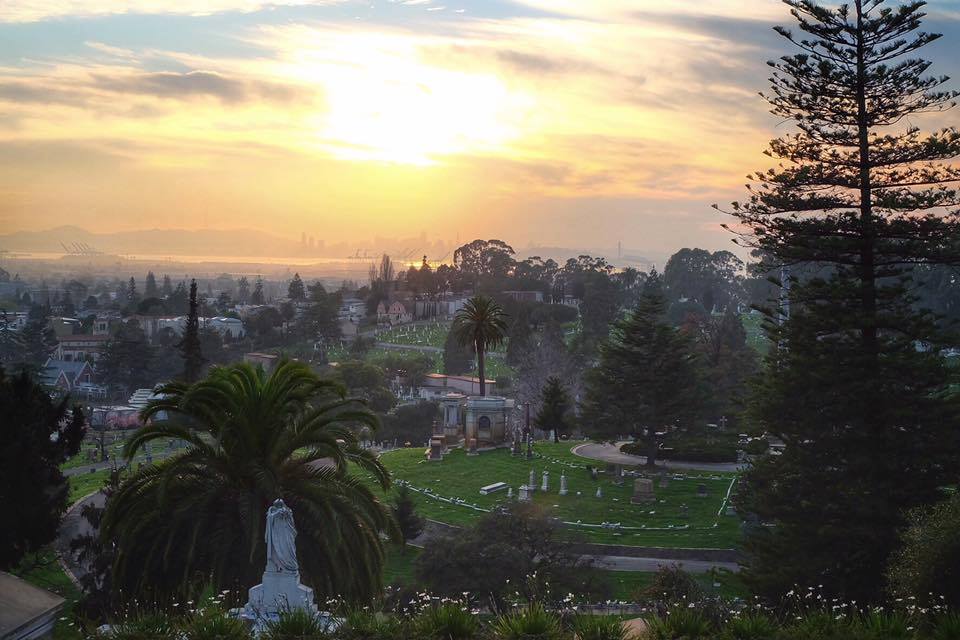
The sunset I mentioned. Photo credit Amal.
In our materialistic society, I absolutely define my value by what I’m producing and I know businesses define my value by how much I’m able to consume. That means if I don’t produce something every single day, my perceived self-worth diminishes. Heaven forbid I take a rest day! That’s also why my health condition, maladaptive stress syndrome, is so freaking challenging: I’m tired all the time. I need more rest than the average person, but that also means I can’t do as much as the average person. And because I can’t do as much, produce as much, my self-worth goes in the toilet.
I have to remind myself over and over what my life is really about, which is to achieve a divine union, and that’s not dependent on how much money is in my bank account or how many followers I have on instagram. Furthermore, my spiritual teacher says, “The Milky Way is vast from one end to the other; an ant is a very small creature, but the role of both of them in maintaining the balance of the universe is equal. If one ant meets a premature death, it will disturb the balance of the entire cosmos. Therefore, nothing here is unimportant, not even an ant.”
That means I’m important, you’re important, we’re important even if we never win a Nobel prize or an Oscar, because our worth is not inherent on what we’re doing. I could lie in bed all day every day and be just as important as a school teacher. I have to tell you I have so much resistance to saying that, but I’d really like to believe it’s true. If the Milky Way is just as important as an ant, how could it not be?
I dream of a world where we recognize our inherent value and worth as precious human beings. A world where we realize we matter just because we are alive. A world where we remember we are blessed children of the universe, no less and no more important than anyone else. A world where we remember who we really are.
Another world is not only possible, it’s probable.
Last week, I watched an inspirational movie about kids who utilized their talents to win scholarships to college and pull themselves out of poverty. All of the kids were the first in their families to go to college, and by doing so they become teachers, writers, policemen, etc. They weren’t forced to work in low-wage jobs like their parents were.
I teared up watching the flick – I love that they improved their lives – but then I got to thinking, “What about everyone else?” What about the kids who don’t have an exceptional talent that wins them a scholarship? These kids escaped the cycle of poverty, but someone else is waiting in the wings to take their place. Just because one person no longer has to pick oranges for a living doesn’t mean oranges stop getting picked. It doesn’t mean all the other orange pickers no longer have to endure poor working conditions and low wages.
The cycle of exploitation continues and our capitalistic economy feeds off it. In the case of food production, almost literally. Why is this? Because we continue to emphasis the rights of individuals (or corporations, who are now considered people) over the collective.
I’ve seen the individual versus the collective show up in a big way this week with the killing of Cecil the Lion. Minnesotan dentist Walter Palmer paid $50,000 to hunt Cecil the Lion, who was a big tourist attraction in Zimbabwe. Did Palmer think about anyone other than himself when he set out to kill Cecil? No he did not. He was prioritizing his own selfish interests.
Another way that the individual versus the collective is prioritized is the public’s reaction to the killing of Cecil. We’re directing so much ire against Palmer, but not talking as much about poaching laws in general. Outrage has reached such a fever pitch that Zimbabwe is calling for Palmer’s extradition and many people in the U.S. agree. I think part of the reason we’re seeing so much outrage over Cecil is it’s easy to excoriate an individual.
A few of my friends who are more focused on the collective have exclaimed they wish society would be as outraged over the killing of black people in our country as people are over the killing of Cecil. It’s harder to evoke as much outrage against a system, which is also harder to dismantle, than it is to get pissed off an at individual. Racism is so rampant, it’s seeped into many aspects of life, and how do you go about changing something like that?
I think it starts with prioritizing the collective. There is an African proverb that says, “If you want to go fast, go alone. If you want to go far, go together.” We are not going to go far if we keep focusing on ourselves alone. We are not going to solve any of our serious societal problems if we’re thinking, “How can I benefit?” instead of “How can we benefit?” Life can be better for all of us but that starts with striking a balance between the individual and the collective.
My spiritual teacher says, “One must not forget that collective welfare lies in individuals and individual welfare lies in collectivity. Without ensuring individual comforts through the proper provision of food, light, air, accommodation, and medical treatment, the welfare of the collective body can never be achieved. One will have to promote individual welfare motivated by the spirit of promoting collective welfare.”
I dream of a world where we go far, together. A world where we prioritize taking care of each other. A world where we understand what’s good for the collective is also good for the individual. A world where we work to raise each other up, and improve life for us all, because after all, you plus me equals we.
Another world is not only possible, it’s probable.
For audio, scroll to the bottom.
I have some hang-ups about money. I think it’s safe to say I’m not alone in this. For a long time I thought if I made a lot of money I would turn into a jerk, which is kind of silly because to paraphrase Henry Ford, money doesn’t change people, it merely unmasks them. If a person is naturally selfish or arrogant or greedy, the money brings that out. I’m not naturally mean spirited so I think it’s safe to say making more money won’t bring those qualities out in me.
Once I cleared that hurdle, the idea of being a “conscious millionaire” started to appeal to me. It sounds great! Someone who is kind and compassionate, but also has money. Someone who can donate to her favorite charities and change some things because as we’re all aware, in this day in age, money equals power. If I became the richest person in the world then I could change the rules and make things better for everyone! Except, in a conversation I had with a friend on Friday night, I realized being a conscious millionaire is not enough.
I’m currently in the middle of nowhere Missouri. I mean really middle of nowhere. The closest town (about 20 minutes away) has a population of around 2,000. When I think “middle of nowhere,” I think cheap. When I asked my friend how much he’s paying for internet, I nearly choked on my tea when he said a telephone and internet combo is costing him $100 a month. For a speed of 1.5 mbps! If I was in California, I could pay $65 a month for a speed of 45 mbps! What makes this all the more depressing is my location isn’t exactly booming economically, meaning the people who are the least likely able to afford $100 a month for a regular landline phone and DSL are the ones getting price gouged. The wealthy areas are where people are paying less for phone and internet service.
It was in that moment that I realized being a conscious millionaire would only help so much. Sure, I can donate to my favorite charities and help family and friends, but what about the people I’ll never meet? Those in the Ozarks or the Bible Belt or the Midwest? My millions won’t help them at all. The only thing that will help them is a complete dismantling of our current economic system. And that requires an economic revolution. A “reform” just won’t cut it. The very principles of capitalism are founded on greed and selfishness, and greed and selfishness have given us the world we currently live in.
But we don’t have to keep living in that world. Alternative economic systems exist. I’ve written about it before, but Prout – the Progressive Utilization Theory – is an alternative to capitalism and communism. Prout is economics based on compassion and love, on understanding all beings are worthy of love and respect. It takes out exploitation and gives more power to workers through its emphasis on cooperatives. The utilities – water, electricity, and in this day and age I would argue, internet – would be taken care of by the government so we no longer have a situation where someone in Missouri is paying $100 for slow speeds and poor service.
In the words of John Lennon, “You may say I’m a dreamer, but I’m not the only one.”
I dream of a world where economics is based on taking care of everyone rather than exploitation. A world where we share more than we consume. A world where we are stewards of the Earth rather than masters over it. A world where we’ve revolutionized our economy.
Another world is not only possible, it’s probable.
- « Previous
- 1
- 2
- 3
- Next »
